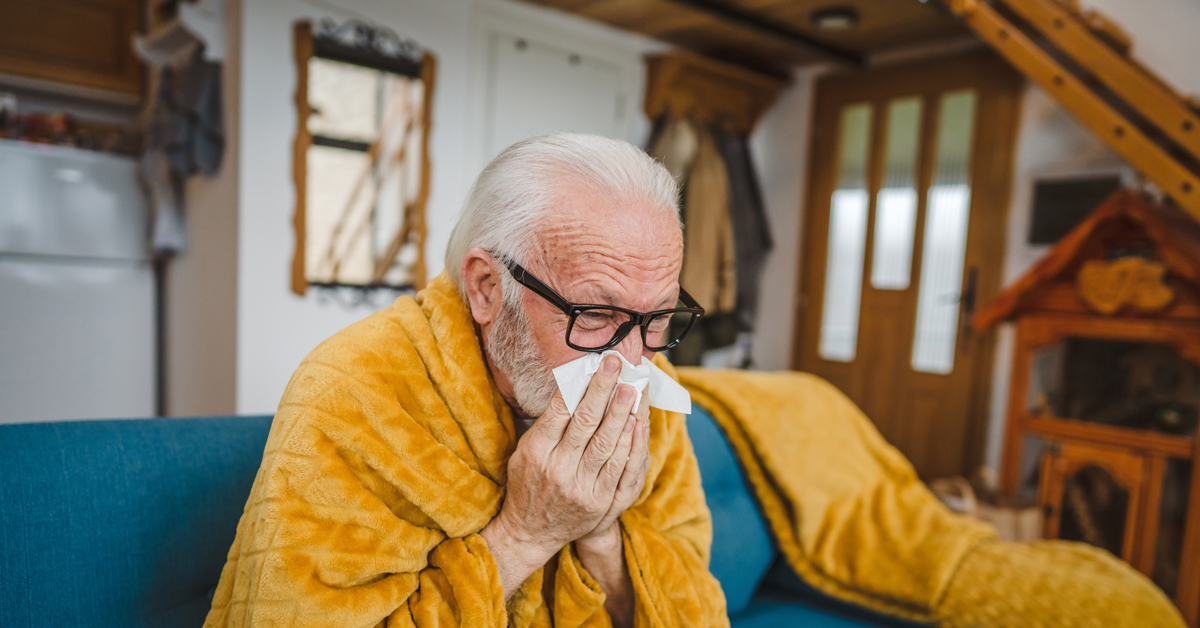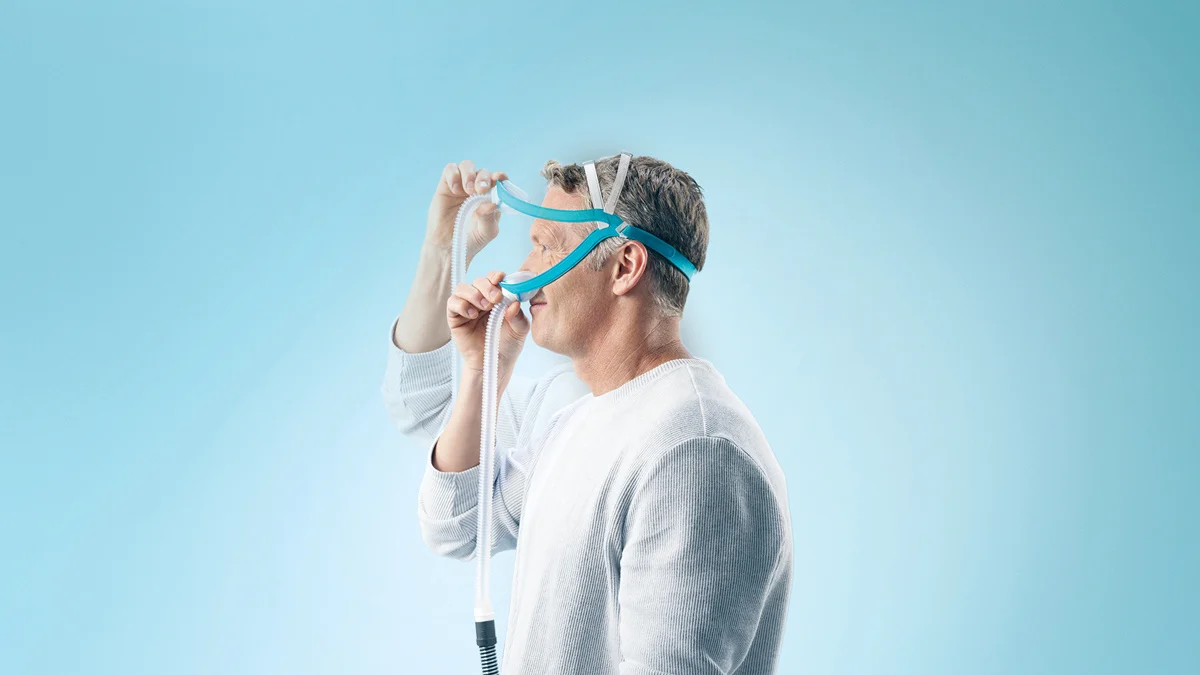Studies show: People with supportive partners manage their condition more effectively.
People with sleep apnea may snore loudly and gasp for breath. This impacts not only their sleep but that of their partners.
No one can function at their best after a bad night’s sleep. And being sleep-deprived night after night is bound to take its toll on overall health and well-being.
Fortunately, sleep apnea can be effectively treated with CPAP (continuous positive airway pressure). Unfortunately, some people with sleep apnea are not adherent to their therapy, which can impact certain health conditions, such as stroke, heart attack, diabetes, and obesity.
Now, recent studies show that people with sleep apnea who have supportive partners are more likely to comply with therapy, which leads to improved quality of life for all involved.
Here are 10 simple tips to help you support your partner with sleep apnea—and yourself!
1. Recognize the Symptoms of Sleep Apnea
People with sleep apnea often don’t realize they have symptoms because many occur while they are sleeping. That’s why their partners need to be able to recognize major symptoms including:
- Loud, chronic snoring
- Gasping for air while sleeping
- Difficulty staying asleep (insomnia)
- Night sweats
- Morning headaches
- Morning sore throat or dry mouth
- Frequent need to wake up to urinate
2. Speak With Your Doctor About Sleep Apnea
If you suspect your partner has sleep apnea, contact your doctor. Be sure to go to the appointment with your partner to better understand the doctor’s treatment recommendations. And ask questions!
To diagnose sleep apnea, doctors often recommend a sleep study. It is conducted overnight at a sleep laboratory or at home with special equipment that records brain waves, oxygen levels, and heart rhythm.
For more information: Sleep Studies Help Diagnose Sleep Disorders so You Receive the Treatment You Need
3. Speak With Others Who Have Sleep Apnea
You’ll learn firsthand how other people deal with the challenges of sleep apnea. Chances are, you probably know people who are dealing with sleep apnea. If not, ask your doctor for recommendations for sleep apnea support groups.
4. Encourage Your Partner to Adhere to Their CPAP Therapy
CPAP is considered the “gold standard” of sleep apnea care. But it’s only effective when it’s used every night. Complying with CPAP therapy offers many important health benefits:
- Improves sleep and reduces daytime sleepiness
- Eliminates snoring
- Maintains heart health and healthy blood pressure levels
- Produces a better mood and attitude
- Improves productivity at work, home, or school
5. Learn How Their CPAP Device Works
Work with your partner to learn how the CPAP device works and how to keep the equipment clean. Try on the mask and see how it feels. Help your partner clean and refill their machine. Sharing the responsibilities demonstrates your commitment to your partner and CPAP therapy.
For more information: All About CPAP
6. Make Your Bedroom Sleep-Friendly
To increase the quantity and quality of sleep, it’s important to improve your sleep hygiene. Follow these simple steps:
- Keep your bedroom cool and dark; use blackout curtains if necessary
- Maintain a regular sleep schedule
- Turn off your cell phone, tablets, and computers at least 30 minutes before you turn in
- Avoid alcohol and caffeine
- Reduce fluid intake before bed to reduce nighttime trips to the bathroom
For more information: Why Sleep Hygiene is Essential
7. Suggest Lifestyle Changes
Lifestyle changes are a simple yet effective way to help reduce sleep apnea symptoms. Changes may include:
- Developing healthy sleeping habits
- Following a heart-healthy diet and losing weight
- Keeping well-hydrated
- Exercising regularly
- Reducing stress with meditation, yoga, or mindfulness
- Sleeping on your side
8. Communicate Honestly, Openly, and Respectfully
Sleep deprivation can lead to short tempers. But rather than argue, it’s important for both you and your partner to talk about how sleep apnea is affecting your health as well as your relationship.
For instance, some people with sleep apnea may not believe how much they snore and gasp for air throughout the night. Consider recording them so they will better understand.
Once you’ve identified a problem, you’ll be that much closer to finding a solution.
9. Support Each Other if You Both Have Sleep Apnea
In some households, both partners have sleep apnea. The goal is to support each other. Take turns cleaning your CPAP devices and accessories and refilling the tanks. Remind each other to put on the mask and turn on the device. If you hear air leaks coming from a mask, wake the other and adjust it.
Working as a team makes the whole process easier!
10. And Don’t Forget: Support Yourself!
Sleep apnea is challenging—not only for your partner but for yourself. You may be as sleep-deprived as your partner.
If your partner’s snoring keeps you up at night, wear earplugs. You may also want to consider alternative sleeping arrangements temporarily until your partner becomes accustomed to the CPAP device.
If you feel your health is being negatively affected, don’t hesitate to contact your doctor. You must support yourself so you can continue to help support your partner!
References
1. Ye L, Malhotra A, Kayser K, Willis DG, Horowitz JA, Aloia MS, Weaver TE. Spousal involvement and CPAP adherence: a dyadic perspective. Sleep Med Rev. 2015 Feb;19:67-74.
2. American Academy of Sleep Medicine (AASM). (2012, April 15). Getting spouses involved may improve CPAP compliance.
https://sleepeducation.org/getting-spouses-involved-improve-cpap-compliance/.
3. Parker, H. (2022, August 03). When Your Partner Has a Sleep Disorder. WebMD. https://www.webmd.com/sleep-disorders/when-your-sleep-partner-has-sleep-disorder.
4. Farrier, S. (2023, June 2). When You and Your Spouse Both Have Sleep Apnea. SleepApnia.SleepDisorders.net. https://sleepapnea.sleep-disorders.net/living/sharing-cpap-maintenance.
5. Vann, M. (2017, June 9). 9 ways to help your spouse with a sleep apnea machine. Next Avenue. https://www.nextavenue.org/support-spouse-sleep-apnea-cpap/.
6. 5 Ways to Help Your Partner with Sleep Apnea. Resmed. https://www.resmed.co.in/blogs/sleep-apnea-symptoms-in-spouse.
LEGAL DISCLAIMER: Material in this newsletter is provided for general health education and informational purposes and to provide references to other resources only; it may not apply to you as an individual. While Apria Healthcare believes that the information provided through this communication is accurate and reliable, Apria Healthcare cannot and does not make any such guarantee. It is not intended to be a replacement for professional medical advice, evaluation, diagnosis, services or treatment (collectively, “medical treatment”). Please see your healthcare provider for medical treatment related to you and your specific health condition(s). Never disregard medical advice or delay seeking medical care because of something you have read on or accessed through this website. Reading this newsletter should not be construed to mean that you have a healthcare provider/patient relationship.


.png)



